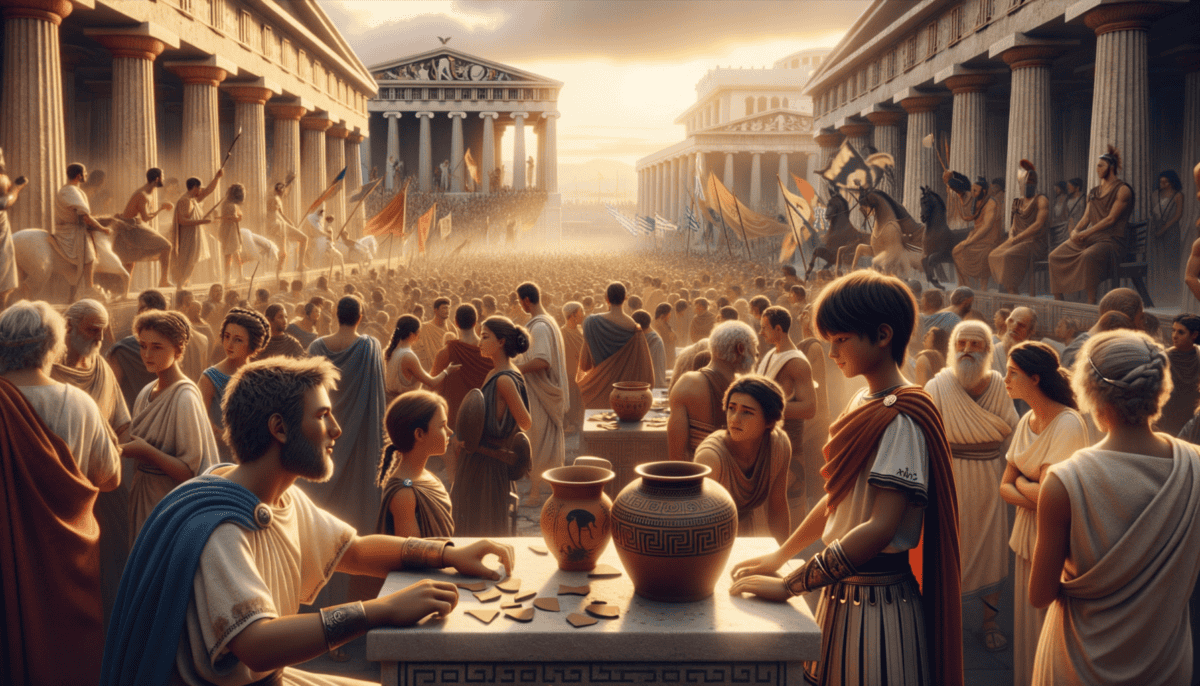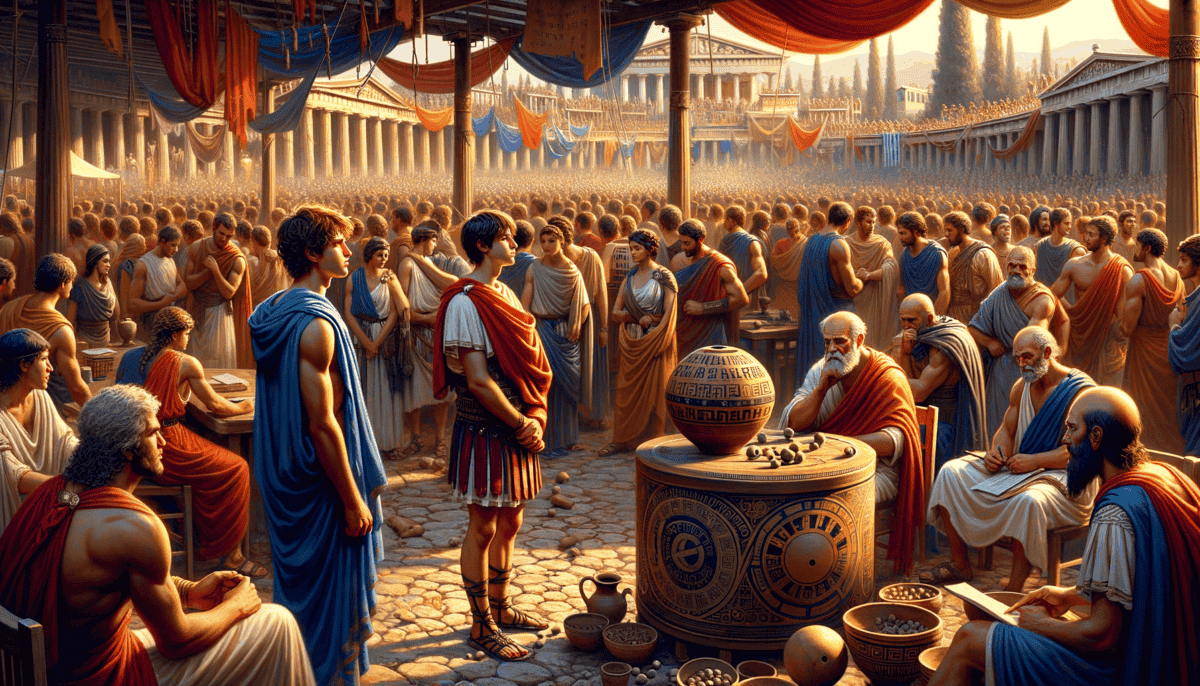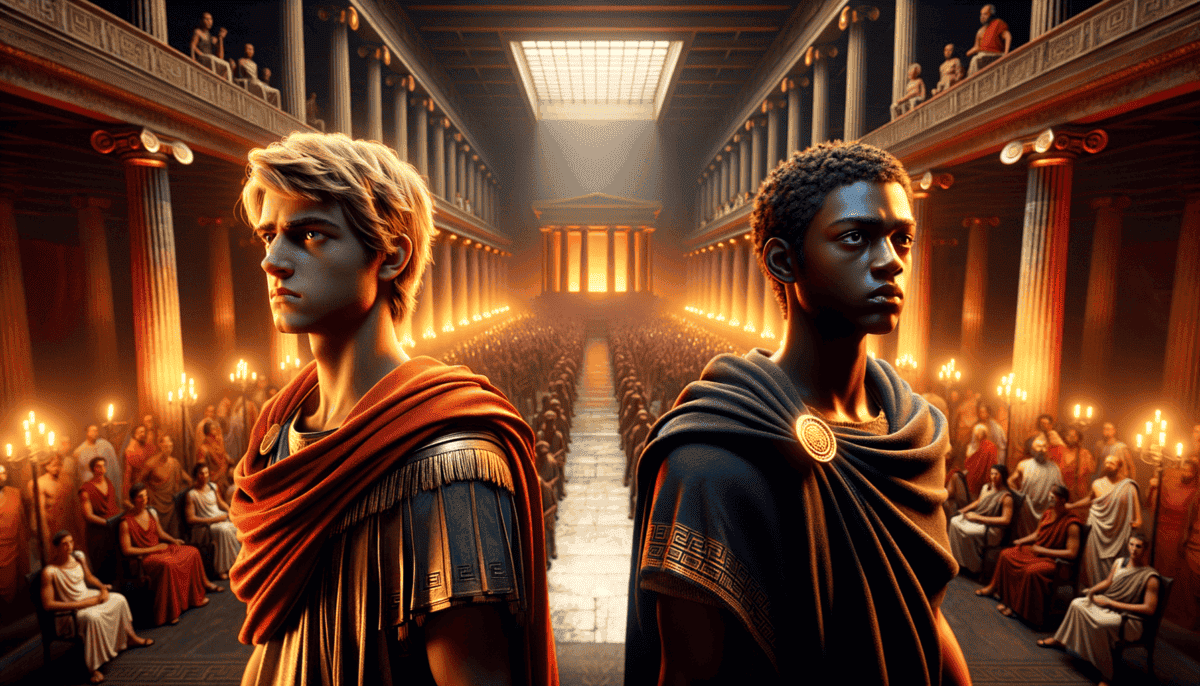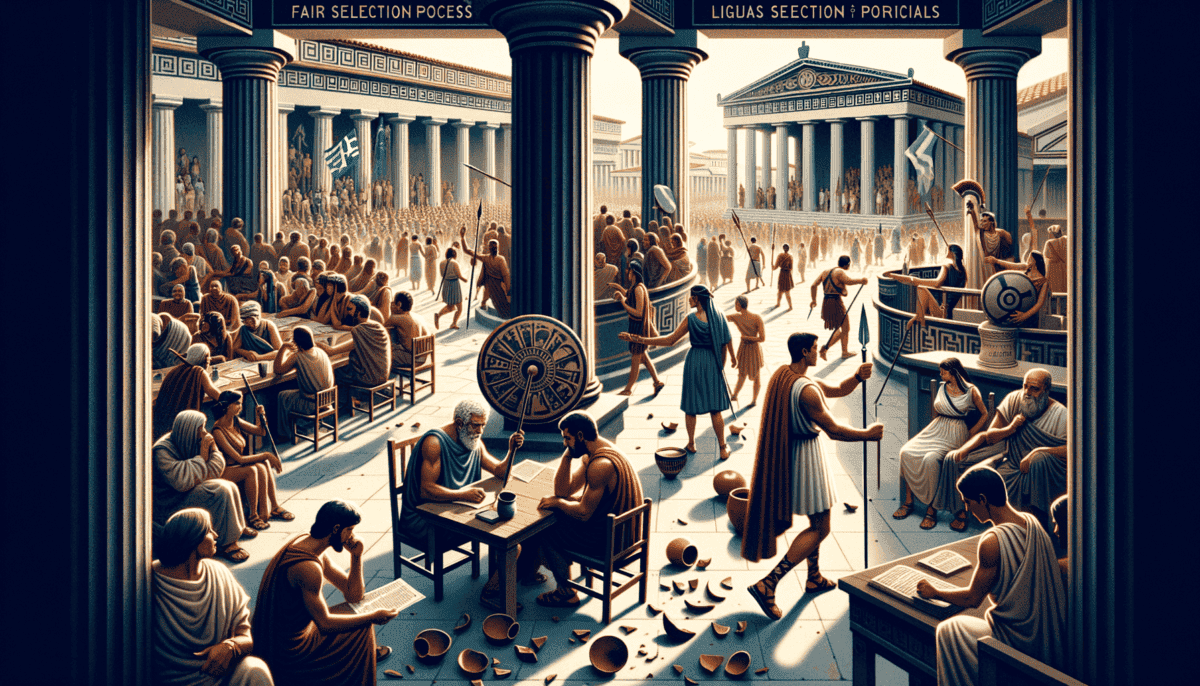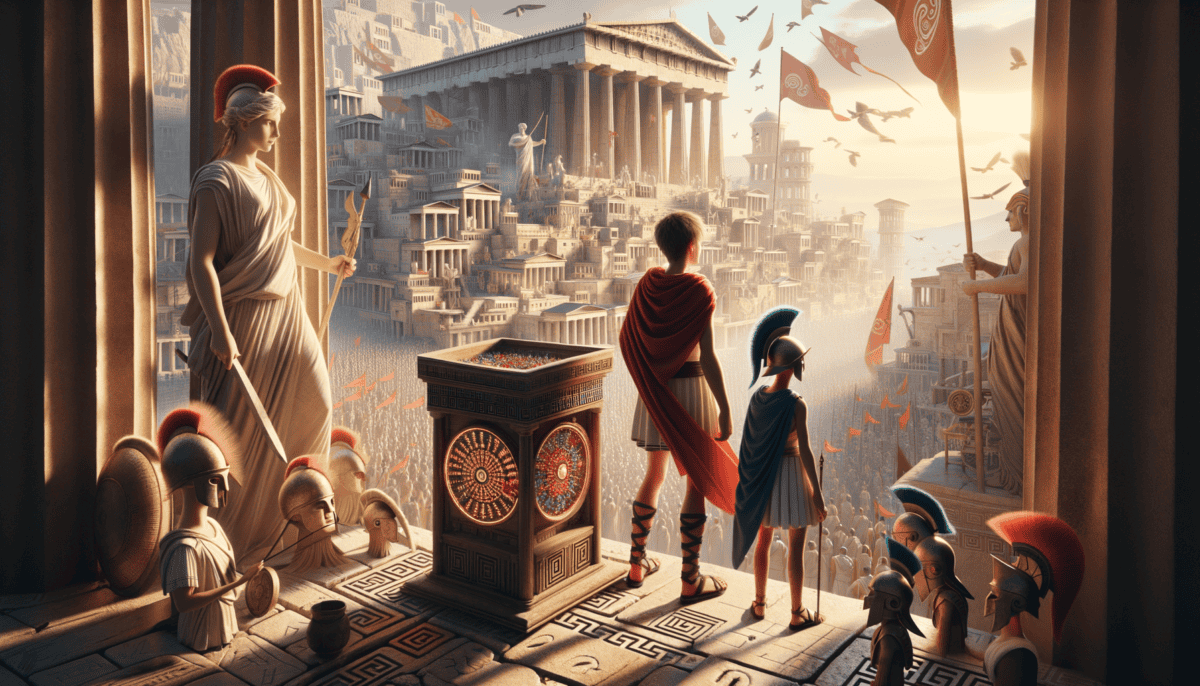A Boy’s First Assembly
The morning sun peeked over the Acropolis as Theo rubbed sleep from his eyes. Today was special – his first time seeing Athens' great assembly!
"Hurry, Theo!" his father called. "We don't want to be late!"
Theo rushed to put on his simple white chiton. At fifteen, he was finally old enough to watch the citizen assembly. His heart beat fast with excitement.
The streets were already busy as they walked to the Pnyx hill. Hundreds of men in white robes climbed the stone steps. Theo had never seen so many people in one place!
"Father, will I get to vote someday?" Theo asked, watching the crowd.
His father smiled. "When you're eighteen, if you meet the requirements."
"What requirements?" Theo's eyes grew wide.
"Well, let me tell you," his father began, holding up his fingers to count:
• You must be born to Athenian parents
• Be a free man (not a slave)
• Complete military training
• Be at least 18 years old
• Own land in Athens
"That's a lot to remember!" Theo exclaimed.
They found seats on the rocky hillside. Below, a speaker stood at a stone platform called the bema. His voice boomed across the assembly:
"Citizens of Athens! Today we vote on building new ships for our navy!"
The crowd erupted in excited chatter. Some men shouted "Yes!" while others yelled "No!"
"How do they decide?" Theo whispered.
"Watch," his father pointed.
The men began raising their hands. Officials counted carefully. It was like counting teams for games at school, but much bigger!
"This is amazing," Theo breathed. He imagined himself standing there one day, helping make decisions for Athens.
“Democracy means ‘rule by the people,'” his father explained. “Every citizen gets a voice.”
On their walk home, Theo couldn't stop talking about everything he'd seen. The huge crowd, the loud debates, the voting – it was all so exciting!
"Father," he said suddenly, "I want to learn everything about how our city works. Will you teach me?"
His father beamed with pride. "Of course, son. That's what being a citizen is all about."
That night, Theo dreamed of standing at the bema himself, speaking to the assembly. He couldn't wait to learn more about how Athens made its big decisions. His journey to understanding democracy was just beginning.
The Bustling Agora
The next morning, Theo walked through the busy Agora, Athens’ main marketplace. The air smelled of fresh bread and olive oil. People rushed all around him. ️
“Look at all the people!” Theo said to himself. He watched merchants selling colorful fabrics and pottery.
A girl about his age caught his eye. She wore different clothes than the Athenians. She was studying a large clay pot with writing on it.
“That’s an ostrakon,” Theo said proudly, happy to share what he knew. “We use them for voting!”
The girl turned. “I’m Zara, from Sparta. We don’t vote like this there.”
“Really? How do you make decisions?” Theo asked.
“Our leaders are chosen differently. They’re picked because they’re old and wise.”
“Here in Athens,” Theo explained, “every citizen gets to vote. Watch!”
He pointed to a group of men gathering nearby. They were each taking a piece of pottery and a sharp tool.
“They scratch the name of the person they want to vote for on the pottery,” Theo said. “Like writing on a leaf, but it lasts longer!”
Zara looked amazed. “Everyone gets to vote? Even regular people?”
“Well, not everyone,” Theo admitted. “You have to be a citizen. But all citizens can vote!”
• Pick up a piece of pottery
• Scratch your vote on it
• Drop it in the counting spot
• Officials count all the pieces
“Look!” Theo pointed excitedly. “They’re counting votes now!”
Officials sat at a table, carefully sorting through piles of pottery pieces. Some had names scratched on them, others had simple “yes” or “no” marks.
“This is so different from Sparta,” Zara said. “There, only a few special people make choices.”
“Which way is better?” Theo wondered aloud.
Zara shrugged. “Both are different. Both have good and bad parts.”
As they watched more citizens drop their pottery pieces into big baskets, Theo felt proud of Athens’ way of voting. But he was curious about Sparta too.
“Will you tell me more about Sparta?” he asked Zara.
She smiled. “If you tell me more about Athens!”
The sun climbed higher as they sat on the steps of a nearby building, sharing stories about their different cities. Maybe they could learn from each other about the best ways to make big choices.
The Mysterious Selection Machine
The morning sun shone bright as Theo and Zara walked to the center of Athens. Today was special – it was time to pick new leaders!
“What’s that strange thing?” Zara pointed to a tall stone machine. It had many slots and tubes running down its side.
“That’s how we pick some of our leaders,” Theo said proudly. “It’s like a big game of chance!”
An old man named Aristos walked up to them. “Would you young ones like to see how it works?”
“Yes, please!” they both said.
Aristos showed them small bronze plates. “Each citizen’s name is on one of these. We put them in the slots.”
“But how do you know who wins?” Zara asked, her eyes wide with wonder.
“Watch this!” Aristos dropped white and black balls into the top tube. They rolled down, making clicking sounds.
“If a white ball comes out, those names get picked,” Theo explained. “It’s like rolling dice!”
Zara looked confused. “You let chance pick your leaders? In Sparta, only the strongest and wisest lead.”
“That’s what makes Athens special,” Aristos smiled. “We believe anyone can be a good leader if they get the chance.”
• Put names in slots
• Drop colored balls
• White ball = picked
• Black ball = not picked
• Everyone gets a fair chance!
“Look!” Theo pointed excitedly. A white ball had rolled out.
The crowd cheered as names were read. Regular people – farmers, makers, and traders – would help run the city!
“But what if someone isn’t ready to lead?” Zara asked.
“That’s why we have training,” Aristos explained. “And they work together, not alone.”
More balls rolled down. More names were picked. The crowd grew bigger.
“It’s like a festival!” Zara laughed, caught up in the excitement.
“That’s democracy,” Theo said proudly. “Everyone gets a chance to help make Athens better.”
As they watched more names being drawn, Theo noticed something important. Some winners looked happy, others nervous. But everyone accepted the machine’s choice.
“Maybe this isn’t so strange after all,” Zara said thoughtfully. “Everyone has a voice in Athens, even if it comes from a machine!”
The sun was high now, and the new leaders were all picked. Tomorrow, they would start learning their new jobs. But today, Athens celebrated its special way of choosing who would help guide the city.
Two Cities, Two Ways
The warm afternoon sun cast long shadows as Theo and Zara sat on a hill overlooking Athens. They had just learned about how leaders were chosen in different ways.
“Tell me about Sparta’s leaders,” Theo asked. “How do they pick them?”
Zara sat up straight and proud. “In Sparta, we have the Gerousia – our wise council of elders. They’re very different from your lottery picks!”
“Only the strongest and wisest can join,” Zara explained. “They must be at least 60 years old and prove themselves worthy.”
Theo’s eyes widened. “That’s so different from Athens! Here, anyone can be picked.”
“But how do you know your young leaders will make good choices?” Zara asked.
“We trust that everyone has something good to give,” Theo replied. “And they work together to help each other.”
A cool breeze rustled through the olive trees as they talked. Zara drew two circles in the dirt.
“Look,” she said, “this is how we pick our leaders in Sparta:”
• Be over 60 years old
• Win a shouting contest
• Have perfect honor
• Serve Sparta all your life
• Be chosen by the people
“A shouting contest?” Theo laughed. “Really?”
Zara nodded seriously. “The people gather in a big field. They cheer loudest for who they think is wisest. The one with the loudest cheers wins!”
“That’s so different from our quiet voting pieces,” Theo said. “But both ways let people choose, right?”
“Yes,” Zara smiled. “Just differently. In Sparta, we believe wisdom comes with age and experience.”
As the sun sank lower, they saw people gathering in the streets below. Some were young, some old, all talking about city matters.
“Maybe both ways can work,” Theo said thoughtfully. “Your wise elders, our random picks…”
“As long as they care about making things better,” Zara added. ⭐
A group of newly chosen leaders walked by, heading to their first meeting. Some looked nervous, others confident.
“They’ll learn,” Theo said. “Just like we’re learning about different ways to pick leaders.”
The stars began to appear overhead. In both Athens and Sparta, leaders would guide their cities through another night, each in their own way.
The Power of the People’s Vote
Rain clouds gathered over Athens as Theo and Zara hurried through the crowded streets. People were whispering about a big vote coming up – an ostracism! ️
“What’s ostracism?” Zara asked, watching worried faces pass by.
Theo’s voice grew serious. “It’s when the people can vote to send someone away from Athens for ten years.”
“Ten years?” Zara gasped. “That’s such a long time! Who are they voting about?”
“Aristides the Just,” an old man nearby said sadly. “Some think he’s getting too powerful.”
They watched as people gathered in the marketplace. Each person held a piece of broken pottery called an ostrakon.
“Look!” Theo pointed. “They’re writing names on the pottery pieces.”
A kind-looking man approached a voter. “Could you write Aristides on my piece? I want to vote against him.”
“Why?” asked the stranger. “Has Aristides done you wrong?”
“No,” the man admitted. “I’m just tired of hearing everyone call him ‘the Just’ all the time!”
• Citizens wrote a name on pottery pieces
• Needed 6,000 votes to count
• Person with most votes had to leave
• They could return after 10 years
• All their property was safe
“That doesn’t seem fair,” Zara frowned. “In Sparta, we honor our good leaders.”
“It’s to protect our democracy,” Theo explained. “No one should get too powerful.”
Thunder rumbled overhead as more people arrived to vote. Some looked worried, others determined. ⚡
“The man they’re voting on – it’s me,” said a quiet voice behind them. They turned to see Aristides himself!
“But you’re called ‘the Just’!” Zara said. “Doesn’t that mean you’re good?”
Aristides smiled gently. “Even good things can make some people angry. That’s why we have this vote – to keep peace.”
As rain began to fall, people dropped their pottery pieces into big counting jars. Each piece made a soft clicking sound. ️
“Will you be okay?” Theo asked Aristides.
“Athens will be okay,” Aristides answered. “That’s what matters most.”
The counting would take hours. Theo and Zara watched from under a shelter as voters hurried past in the rain.
“Your city gives everyone such big power,” Zara said softly.
“Yes,” Theo nodded. “And big responsibility too.” ⚖️
As evening fell, they could still hear the quiet click-click-click of pottery pieces being counted, each one a voice in Athens’ democracy.
Legacy of Ancient Voices
The golden sun rose over Athens on Theo and Zara’s final day together. They sat on a hill overlooking both the Agora and the Acropolis, thinking about everything they had learned.
“I never knew voting could be so important,” Zara said, drawing circles in the dust. “In Sparta, we trust our elders to make all the big choices.”
Theo nodded thoughtfully. “Each city found its own way. Athens with our pottery votes and random picks, Sparta with its wise council.”
“Remember when we first met?” Theo laughed. “I thought I knew everything about government just because I could vote.”
“And I thought Sparta’s way was the only right way,” Zara smiled. “We were both wrong!”
“The best leaders listen to many voices,” Theo said, remembering Aristides’ words.
Below them, people were gathering for today’s assembly. Some carried voting tokens, others held scrolls with new ideas to share.
• Everyone’s voice matters
• Different systems can work
• Voting brings responsibility
• Change takes time
• Working together helps everyone
“Look!” Zara pointed to a group of young boys practicing with the selection machine. “The next generation is already learning!”
Theo watched the children taking turns, their faces bright with excitement. “That’s how democracy stays strong – by teaching others.”
“Will you write to me in Sparta?” Zara asked. “Tell me about the big votes?”
“Of course! And you can tell me about your council meetings. We can learn from each other!”
As they walked down the hill, they passed the spot where they first met. A new voting area was being built there.
“Look how much has changed,” Theo said. “And how much more will change!”
Zara picked up a piece of broken pottery – perfect for voting. “Maybe someday, all cities will find ways to hear everyone’s voice.” ️
“That would be wonderful,” Theo agreed. “And it starts with people like us, learning from each other.”
The morning sun cast long shadows as they reached the city gates. New voices filled the air – citizens ready to shape their future together.
“Goodbye, Theo of Athens,” Zara said with a smile.
“Goodbye, Zara of Sparta,” he replied. “Thanks for helping me see with new eyes.”
As Zara’s figure disappeared down the road, Theo turned back to his city. The sound of democracy – voices, votes, and hope – echoed through the streets. The future was bright, and everyone had a part in making it shine. ✨


